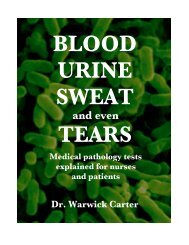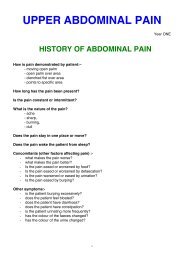Menopause A to Z.pdf - Medwords.com.au
Menopause A to Z.pdf - Medwords.com.au
Menopause A to Z.pdf - Medwords.com.au
You also want an ePaper? Increase the reach of your titles
YUMPU automatically turns print PDFs into web optimized ePapers that Google loves.
MENOPAUSE A <strong>to</strong> Z<br />
The muscles in the myometrium are among the strongest in the human body. They expand <strong>to</strong> ac<strong>com</strong>modate the<br />
growing foetus, and when the time <strong>com</strong>es for the baby <strong>to</strong> be born they engage in a series of contractions, helping the<br />
hither<strong>to</strong> tightly closed cervix <strong>to</strong> open and propelling the baby in<strong>to</strong> the vagina during labour. About six weeks after<br />
pregnancy, the muscles have shrunk again and the uterus has returned <strong>to</strong> its normal size.<br />
See also FIBROIDS OF THE UTERUS; HYSTERECTOMY; MENSTRUAL PERIOD; VAGINA.<br />
VAGINAL BLEEDING ABNORMAL<br />
Abnormal vaginal bleeding (metrorrhagia) that occurs away from the normal menstrual period, may be c<strong>au</strong>sed by<br />
conditions in the vagina, uterus and ovaries, or may be hormonal.<br />
A woman may not realise that she is pregnant, and an abnormal bleed may be c<strong>au</strong>sed by a very early miscarriage.<br />
Up <strong>to</strong> 15% of all pregnancies end as a miscarriage, usually bec<strong>au</strong>se of some abnormality in the developing foetus or<br />
placenta.<br />
During the menop<strong>au</strong>se, instead of cycling smoothly and evenly through the monthly changes, sex hormone levels<br />
start <strong>to</strong> change suddenly and inappropriately. This c<strong>au</strong>ses irregular menstrual periods, hot flushes, headaches,<br />
irritability, personality changes, breast tenderness, tiredness and pelvic dis<strong>com</strong>fort. Postmenop<strong>au</strong>sal bleeding (PMB) is<br />
a particular sinister sign and requires immediate investigation.<br />
Taking the oral contraceptive pill will normally regulate the menstrual cycle very effectively, but if a pill is missed, or<br />
fails <strong>to</strong> work bec<strong>au</strong>se of vomiting, diarrhoea or interaction with other medications (eg. antibiotics), the sudden change in<br />
hormone levels may c<strong>au</strong>se an irregular bleed. A similar effect can occur when taking hormone replacement therapy<br />
after the menop<strong>au</strong>se.<br />
Endometriosis is a sinister disease which is due <strong>to</strong> cells that normally line the inside of the uterus be<strong>com</strong>ing<br />
displaced, and moving through the Fallopian tubes <strong>to</strong> settle around the ovary, in the tubes themselves, or on other<br />
organs in the belly. In these abnormal positions they proliferate, and when a menstrual period occurs, they bleed as<br />
though they were still in the uterus. This results in pain, adhesions, damage <strong>to</strong> the organs they are attached <strong>to</strong>, and<br />
infertility.<br />
A psychological stress (eg. death in family, losing job) may affect a woman’s pituitary gland under the brain and thus<br />
her sex hormone levels so that her menstrual periods s<strong>to</strong>p or be<strong>com</strong>e frequent and irregular.<br />
An intr<strong>au</strong>terine contraceptive device (IUD) may irritate the uterus <strong>to</strong> c<strong>au</strong>se a vaginal discharge and irregular<br />
bleeding.<br />
Other uterine c<strong>au</strong>ses of abnormal vaginal bleeding include fibroids (balls of scar tissue in the muscular wall of the<br />
uterus), pelvic inflamma<strong>to</strong>ry disease, ec<strong>to</strong>pic pregnancy (pregnancy outside the uterus), a prolapsed uterus (uterus<br />
slips down in<strong>to</strong> vagina), irritation of the uterus after an abortion, a hydatidiform mole (an overdeveloped cystic placenta)<br />
and polyps, and tumours or cancer of the uterus (endometrial carcinoma).<br />
Vaginal c<strong>au</strong>ses include an infection of the vagina (vaginitis), ulceration and bleeding from the wall of the vagina,<br />
ulcerated or cancerous cervix or vagina, an injury <strong>to</strong> the vagina from over enthusiastic sex, using mechanical sex aids<br />
or a fall astride a bar.<br />
Ovarian c<strong>au</strong>ses include mittelschmerz (slight blood loss and pain at the time of ovulation), and tumours, cysts or<br />
cancer of the ovary.<br />
Any disease that slows the rate at which blood clots, and drugs used <strong>to</strong> slow blood clotting (eg. warfarin) may c<strong>au</strong>se<br />
abnormal vaginal bleeding if the dose is <strong>to</strong>o high.<br />
See also MENSTRUAL PERIOD; MENSTRUAL PERIODS HEAVY; MENSTRUAL PERIODS, LACK OF; VAGINAL<br />
DISCHARGE<br />
VAGINAL CANCER<br />
Cancer that starts in the vagina is rare and usually occurs in women between 50 and 70 years of age, but cancer<br />
may spread <strong>to</strong> the vagina from the vulva, cervix, endometrium (lining of the uterus) or ovaries. Most primary vaginal<br />
cancers are a form of squamous cell carcinoma. There is some evidence that those who have a human papillomavirus<br />
(HPV) infection are more likely <strong>to</strong> develop this form of cancer. An HPV vaccine is now available.<br />
The usual first symp<strong>to</strong>m is abnormal bleeding (particularly after sexual intercourse), pain and a foul discharge. The<br />
diagnosis can be confirmed by a smear or biopsy taken from the suspicious area, which can usually be easily felt<br />
during a vaginal examination and seen using a vaginal speculum.<br />
Available treatments include surgical removal of the vagina and a hysterec<strong>to</strong>my or irradiation. Chemotherapy is not<br />
normally appropriate.<br />
See also VAGINAL BLEEDING ABNORMAL; VULVAL CANCER<br />
VAGINAL DISCHARGE<br />
A vaginal discharge can vary from a minimal clear discharge due <strong>to</strong> excess production of the normal moisture in the<br />
vagina, <strong>to</strong> copious quantities of pus, and blood.<br />
The most <strong>com</strong>mon c<strong>au</strong>se is leucorrhoea, which is not a disease. The vagina is a moist cavity, and like the mouth,<br />
49









